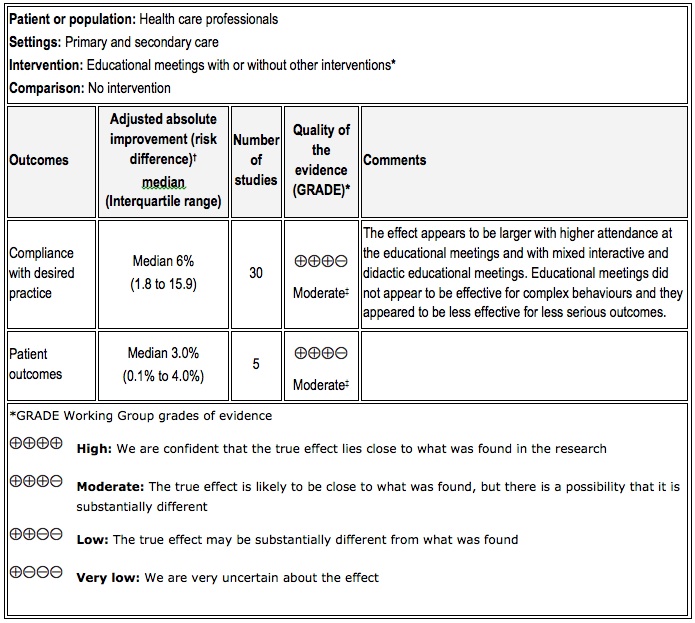How should information about barriers and the likely effects of
strategies for addressing them be summarised?
In a policy brief, the section describing implementation
considerations should include descriptions of the following:
- Important barriers to implementing each option, including:
-
- The evidence and judgements used to characterise the
barriers
- Strategies for addressing the barriers, including:
-
- A concise summary of the advantages and disadvantages
(including costs) of the implementation strategies
- The quality of the evidence
- Any important limitations of systematic reviews or processes
used to summarise the evidence of the likely effects of
implementation strategies
- Important gaps in the evidence
A summary of findings, as described in SURE
Guide 4 (together with
worksheets for providing a summary of findings), can
help decision makers to develop an accurate understanding of the
effects of the implementation strategies described in a policy
brief. The summary of findings should include:
- The characteristics of the evidence, including the types of
participants, the types study settings, the implementation
strategy, and what the strategy was compared to
- The most important outcomes, including intended changes
(benefits) and possible harms and costs
- The estimated effect of the intervention on each important
outcome (preferably in quantitative form)
- The amount of information upon which the information is
based
- The quality of the evidence for each outcome
The same additional considerations described in
SURE Guide 4 are relevant to implementation strategies.
These include: judgements about the impacts on equity, resource
usage and costs, and the need for monitoring and evaluation. An
example of a Summary of Findings table for an implementation
strategy is provided in Table
5.1. Additional examples, as well as guidance on making
judgements about impacts on equity,
resource use
and costs, and monitoring and
evaluation can be found in the SUPPORT Summaries
(www.support-collaboration.org).
Workshop
materials and a
presentation on identifying and addressing barriers to
implementing options are provided in the ‘Additional resources’ section of
this guide. Further guidance on addressing how an option
will be implemented is available in the SUPPORT Tool.
Table 5.1 An example of a
Summary of Findings table for an implementation strategy:
Educational meetings for health professionals.

Footnotes
*The effect of educational meetings alone on professional practice
was the same as for multifaceted interventions that included
educational meetings
†The post intervention risk differences are adjusted for
pre-intervention differences between the comparison groups
‡We have downgraded the evidence from high to moderate because of
inconsistency in the results that could not be fully explained
This page was last updated November 2011.


